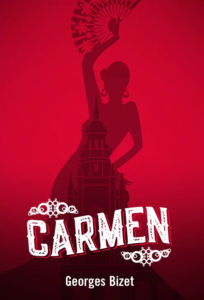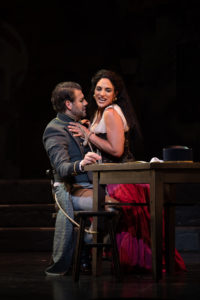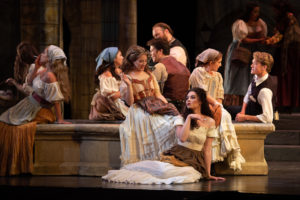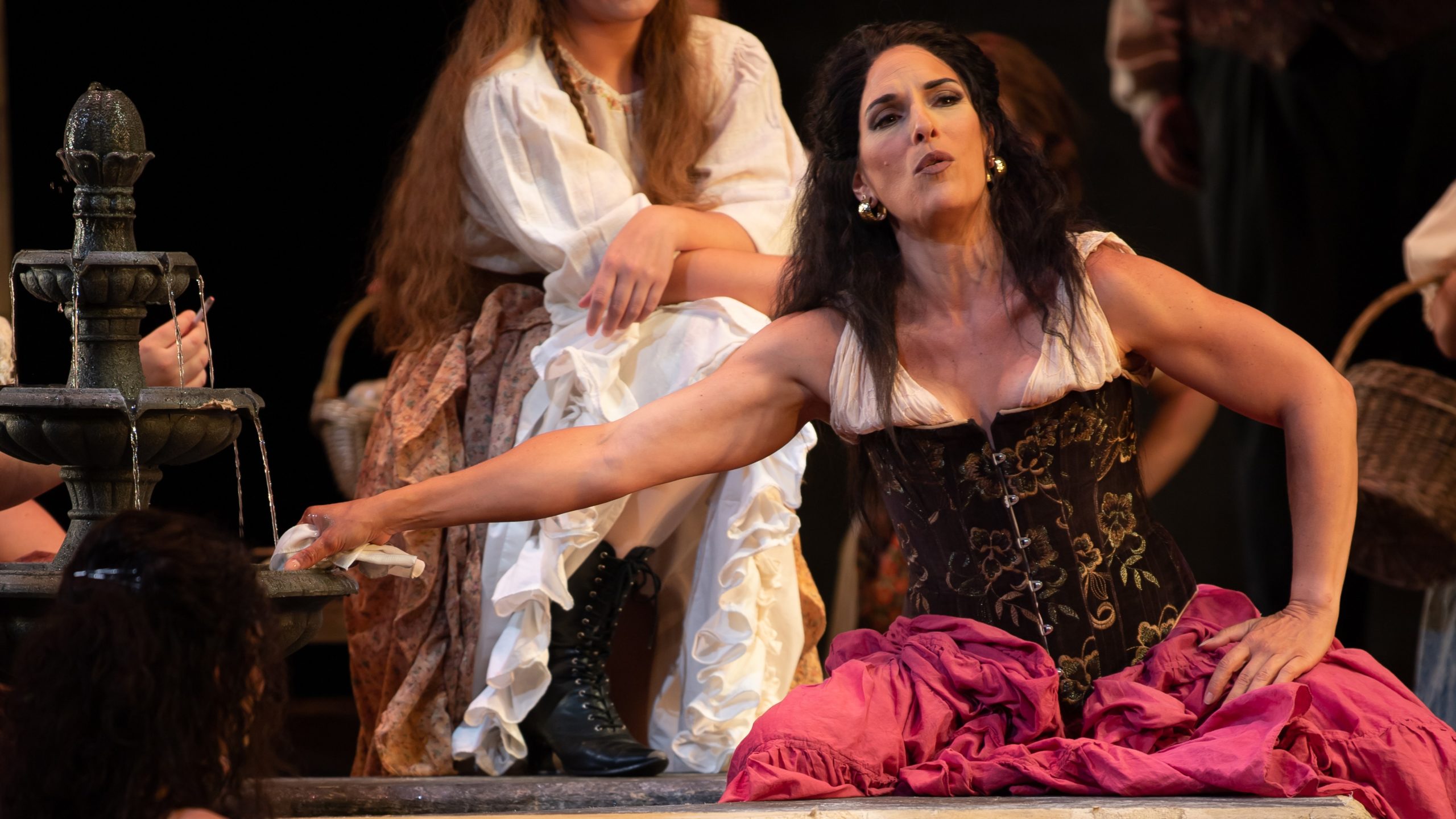LOGAN — Georges Bizet’s opera Carmen can be a beast. It usually clocks in at about three hours, but what a glorious three hours they are! Carmen is the most popular opera in the world and the reason is that there is not a bad moment in the show. Even the parts I don’t like are still magnificent. Utah Festival Opera and Musical Theatre is offering Carmen this season, not only because it’s a crowd pleaser—it’s got some of the most familiar music that has infiltrated our pop culture—but just because the opera is so good. Utah Festival Opera’s production of Carmen does NOT disappoint. The production is quite wonderful.

Carmen is based on Prosper Mérimée’s 1845 novella of the same name, which was inspired by scandalous tales about the Roma people that the author heard while traveling in Spain. It was a fairly radical choice for a subject: a young corporal is seduced by a fiery and desirable factory girl, and whisked from his virtuous life into a life of thievery and intrigue. The story was divisive from the beginning. Carmen premiered in March 1875, but did not go down well. The audience was shocked at its blatant sexuality, on-stage murder, portrayal of crime, and — above all — its unconventional heroine, who was most definitely not a woman of virtue. However, outside of Paris, its popularity spread like wildfire.
The role of Carmen is a landmark in the world of opera, and it requires a mezzo-soprano with skill, strength, sex, and a dang good set of pipes. Without a woman like that, the show falls flat. UFO&MT’s Carmen features Audrey Babcock, as Carmen, who perfectly satisfies all the requirements for the role. Babcock is a force to be reckoned with. Full of life, sex, and a killer voice, Babcock is a hurricane that no one can resist. And who would you want to? She is sure and comfortable in her skin—or should I say Carmen’s skin—and she is the main reason this production is great. Her delivery of the classic Habenera, “L’amour est un oiseau rebelle,” is wonderful, as is every one of her arias. And she can play the castanets!

But it is not only Carmen that sets the tone and assures a good production. Babcock’s co-stars have to pull their operatic weight as well, and they do, in spades — or “piques,” in this case (a little inside Carmen joke). Utah’s own Isaac Hurtado plays the naïve and jealous Don Jose, who gives up everything for Carmen and gets betrayal in return. Hurtado, a veteran to the role, gives a strong performance. His “La fleur que tu m’avais jetée” aka “The Flower Song” is lovely. With a dramatic tenor voice, and strong acting chops, he stays toe to toe with Babcock.
Kara Goodrich is a lovely Michaela, the home town girl hopelessly in love with Don Jose, and a reminder of the life he has sacrificed for Carmen. Goodrich has a big and true soprano and sang the socks off the Act III “Je dis que rien ne m’épouvante” (“I say that nothing frightens me”). However, Goodrich’s acting did not fulfill the role’s full potential. The problem with Michaela is that it is a deceptively simple role, most often played as just a vapid ingénue, which not only is uninteresting, but an incorrect choice. Michaela is not a vapid ingenue. Yes, she is young and naïve, but she is courageous, and loyal, faithful and virtuous. There is nothing vapid in that. On the contrary, it is intensely interesting. Had the director guided Isernia more toward that Michaela, the actress could have truly soared in the role.

Other women in this production are truly marvelous, especially Victoria Isernia as Mercedes and Sara Lucille Law as Frasquita, Carmen’s “besties” (in the vernacular). Both women have amazing voices, good acting instincts and are engaging to watch. The Act II “Nous avons en tête une affaire” (aka “The Quintet”) sung with Carmen and the two wonderful thieving scoundrels Dancairo (played by John Tibbets), and Remendado, (played by Bryce J. Bartu) is brilliant and a highlight of the show.
Enormous credit must be given to chorus master, Arthur Bosarge, for the amazing women’s chorus (i.e., the “cigarette girls”). The stage came to life when they entered and sang their beautiful chorus about lazy smoke softly curling skyward. Both the men’s and women’s chorus are standouts. The direction by Valerie Rachelle is excellent: imaginative, inventive and interesting. She knows how to create a good stage picture and move her characters around like chess pieces on a board. Engaging and interesting to watch, Rachelle’s work is able to focus the eye of the audience right where she wants it, but still creating a life on the entire stage.
Under the baton of Karen Keltner, the orchestra is rich, and she keeps the production moving well. However, the tempi seemed a little slow. The sets (designed by Robert Little) and lighting (designed by Chris Wood) are evocative of the time and period. The same goes for the costumes by Emily Stovall, though none of the pants seemed to fit the men.
Audiences should go see Carmen at Utah Festival Opera and Musical Theatre. With a production like this one, it is easy to see why Carmen’s popularity has endured for generations.
[box]The Utah Festival Opera and Musical Theatre production of Carmen plays July 14 and August 5 at 7:30 PM and July 22 and 30 at 1 PM at the Ellen Eccles Theatre (43 South Main Street, Logan). Tickets are $5-85. For more information, visit utahfestival.org.[/box]

